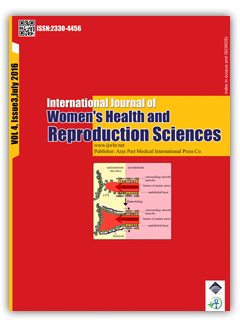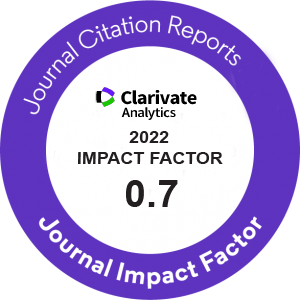| Original Article | |
| The Relationship Between Health Belief and Breast Self-examination Among Iranian University Students | |
| Elnaz Asghari1, Mina Nahamin1, Mehrnoosh Khoshtarash1, Atefe Ghanbari2, Naser Parizad1, Nader Mahdavi3, Zoleikha Asgarlo4 | |
| 1Department of Medical-Surgical Nursing, Faculty of Nursing and Midwifery, Tabriz University of Medical Sciences, Tabriz, Iran 2Social Determinants of Health Research Center, Shahid Beheshti Faculty of Nursing and Midwifery, Guilan University of Medical Science, Rasht, Iran 3Department of Epidemiology, Faculty of Public Health, Iran University of Medical Sciences, Tehran, Iran 4Department of Midwifery, Faculty of Nursing and Midwifery, Zanjan University of Medical Sciences, Zanjan, Iran |
|
|
IJWHR 2016; 4: 110?113 DOI: 10.15296/ijwhr.2016.26 Viewed : 5618 times Downloaded : 3701 times. Keywords : Breast cancer, Breast self-examination, Health belief |
|
| Full Text(PDF) | Related Articles | |
| Abstract | |
Objectives: Breast cancer is a major health problem. Breast self-examination (BSE) is a simple method for breast cancer screening. The health belief model (HBM) is a model for conventionalizing and management of health-related behaviors such as breast cancer screening. The objective of this study was to determine the relationship between HBM and BSE among Iranian university students. Materials and Methods: This was a cross-sectional study conducted on 247 medical and paramedical students of Guilan University of Medical Sciences in 2010. Data was collected using Champion?s Health Belief Model Scale (CHBMS) for breast cancer screening whose validity and reliability have been verified in previous studies. Data was analyzed using descriptive and inferential statistics. Results: The average age of samples was 21.76 ± 2.6 years. Students with a positive family history of breast cancer performed BSE more frequently (9.2% compared with 82.2%, P < 0.05). The mean score of Health Belief Questionnaire was low for the majority of samples (61.94%, n = 153). Students? health beliefs had a statistically significant relationship with performing BSE (P < 0.05). Conclusion: Since medical and paramedical students are regarded as role models of healthy behaviors, it is critical to have an awareness of their health beliefs on BSE. In addition, positive behavior and attitude towards BSE enables students to perform breast cancer screening tests more effectively. According to the results, it is necessary to improve students? knowledge of and attitude towards BSE by training programs. |
Cite By, Google Scholar
Google Scholar
PubMed
Online Submission System
 IJWHR ENDNOTE ® Style
IJWHR ENDNOTE ® Style
 Tutorials
Tutorials
 Publication Charge
Women's Reproductive Health Research Center
About Journal
Publication Charge
Women's Reproductive Health Research Center
About Journal
Aras Part Medical International Press Editor-in-Chief
Arash Khaki
Mertihan Kurdoglu Deputy Editor
Zafer Akan























